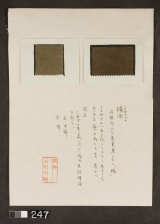Difference between revisions of "Kunugi (Oak) - right (247 R)"
Jump to navigation
Jump to search
(username removed) |
m (MDerrick moved page Kunugi - right (247 R) to Kunugi (Oak) - right (247 R) without leaving a redirect) |
||
| (3 intermediate revisions by 2 users not shown) | |||
| Line 5: | Line 5: | ||
| 247 | | 247 | ||
|- | |- | ||
| − | ! scope="row"| | + | ! scope="row"|Uemura number / title |
| − | | | + | | ; "Haze-some 25" |
|- | |- | ||
! scope="row"|Folder location | ! scope="row"|Folder location | ||
| Line 24: | Line 24: | ||
|- | |- | ||
! scope="row"|Dye (English common name) | ! scope="row"|Dye (English common name) | ||
| − | | Acorn | + | | Oak (Acorn) |
|- | |- | ||
! scope="row"|Dyestuff (botanical name) | ! scope="row"|Dyestuff (botanical name) | ||
| Line 44: | Line 44: | ||
| - | | - | ||
|- | |- | ||
| − | ! scope="row"| | + | ! scope="row"|Uemura's notes |
| − | | This technique produces what was called "Tsurubami ( | + | | This technique produces what was called "Tsurubami ()" in the Ibukuryo () from the 8th century AD, and the name of the plant appears in a Japanese classic poem in the Manysh (), volume 12, from the 7th -8th century AD: |
|- | |- | ||
| − | ! scope="row"| | + | ! scope="row"|Uemura's date |
| Kyoto | | Kyoto | ||
|} | |} | ||
| − | [[Category: | + | [[Category:Uemura dye archive]] |
Latest revision as of 13:48, 23 June 2020
| Museum number | 247 |
|---|---|
| Uemura number / title | ; "Haze-some 25" |
| Folder location | 4th shelf |
| Sample location | right (247 R) |
| Fiber type | cotton |
| Color | dark brown |
| Dyestuff (Japanese common name) | くぬぎ : Kunugi |
| Dye (English common name) | Oak (Acorn) |
| Dyestuff (botanical name) | Quercus acutissima Carruth. |
| Plant part | acorn / dried (?) |
| Dyestuff extraction | boiled in water |
| Auxiliary agent in dye bath | - |
| Mordant | iron |
| Other auxiliary agent | - |
| Uemura's notes | This technique produces what was called "Tsurubami ()" in the Ibukuryo () from the 8th century AD, and the name of the plant appears in a Japanese classic poem in the Manysh (), volume 12, from the 7th -8th century AD: |
| Uemura's date | Kyoto |
